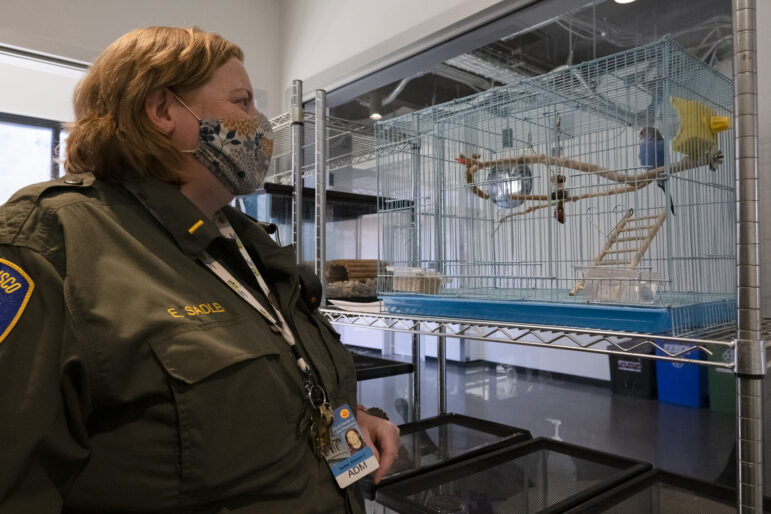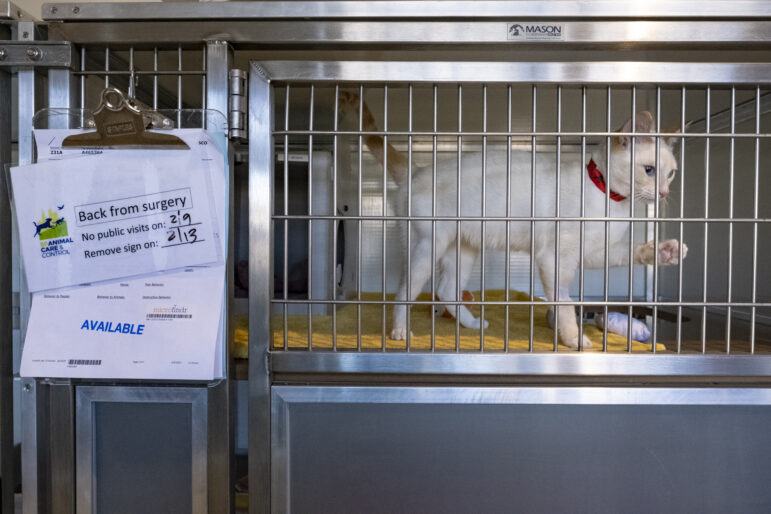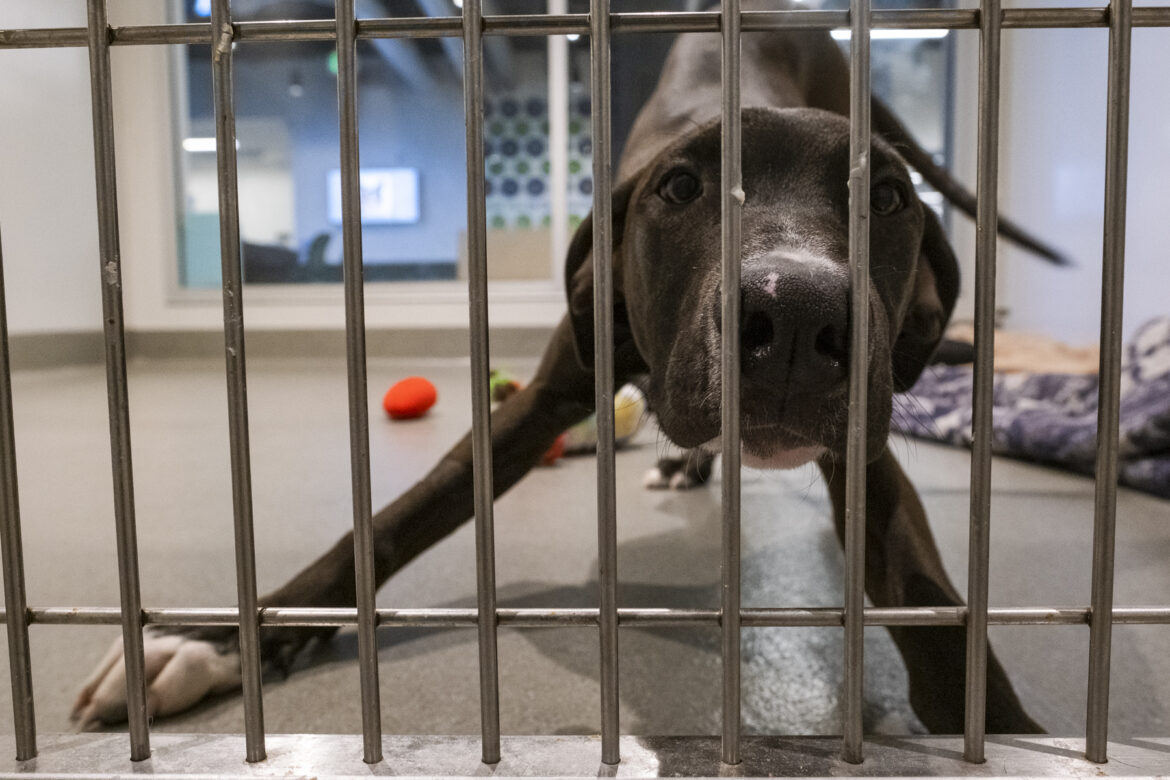This article is adapted from an episode of our podcast “Civic.” Click the audio player below to hear the full story.
Walk into Animal Care and Control’s bright and clean new facility on Bryant Street and you might be greeted by a human volunteer or an adoptable dog. But behind the scenes, officers are investigating alerts about possible abuse, errant wildlife and distressed animals. Animal Care and Control is an emergency service, and officers have been on the job throughout the pandemic, even having to cut hours temporarily as employees fell ill. Though call volume dropped dramatically with the first shelter-in-place order, as workers in many other sectors return to the job and are out and about more, and as kitten season approaches, the facility could see an increase in activity. For the staff on duty, each day can bring surprises.
“That’s what makes the job so exciting, is that you have no idea what the day holds,” Lieutenant Eleanor Sadler said. “So you’re responding to all these calls. And it’s, you know, a sick pigeon that just looks sad on somebody’s doorstep or a raccoon hanging by its foot from a fence or hit-by-a-car possum, or squirrel in a chimney. There’s just a million variations of the trouble the animals can get into that they just needed a little bit of help with.”
Sadler has decades of experience as an officer responding to calls, but she also works with the public in a less tactile way. She is the voice behind the widely popular Officer Edith Twitter account. With the likeness of a former resident Amazon parrot as its avatar, the account posts photos and insights that range from comedic to heartwarming to insightful.
When Sadler first took over the account, “it was me and, like, 100 people, and it was just nonsense. And then I got retweeted by a local journalist,” she said. “And then suddenly, there was a massive input of followers, and things started getting really fun. And I started trying to figure out what works, what represents the agency well or is also interesting to people.”
Neither the Twitter account nor the parts of the facility that are open to the public capture the entirety of what animal control officers do day to day.
“You can’t ever really know what we do until you have this kind of conversation. It’s like, people have no idea that we arrest for animal cruelty,” Sadler said. “But they also don’t see the officer that picks up the 2-week-old kitten and it’s in bad condition but they’re like, ‘we’re on the fence about euthanizing this guy, we don’t think he’s gonna make it,’ and then the officer is like, ‘I’m going to take him home.’ They spend every two hours waking up making formula, warming them up, feeding them, peeing them. You know, it’s not just a job. It’s like a vocation for the people that are here.”

Yesica Prado
Lt. Eleanor Sadler visits the bird room on the second floor of San Francisco Animal Care and Control’s facility on Bryant Street. The facility provides temporary shelter to birds, cats, dogs, fish, guinea pigs, hamsters, rabbits and reptiles.Animals can end up at the shelter many different ways. They can be surrendered by an owner or found loose. Wildlife may need to be removed from an unsafe situation. Sometimes pets need a temporary home, like when the owner goes to the hospital, dies or is incarcerated. Some pet owners find themselves overwhelmed by multiplying animals. Officers also investigate allegations of animal abuse and may seize an animal in a welfare investigation.
“We have hundreds of complaints a year. The majority are either a misunderstanding or just false. And then periodically, we get one that’s really serious. And we have to investigate it thoroughly and put all the pieces together,” Sadler said. “Our main goal is to make sure these people cannot have animals again.”
Last year, a suspect in such a case was arrested after a lengthy investigation found he had inflicted multiple broken bones on his golden retriever puppy. The man pleaded guilty to misdemeanor animal cruelty and neglect.
In many cases, however, officers play less of a law enforcement role and more of an educational one. They teach residents why it’s detrimental to feed wildlife, and how to handle an unexpected animal.
“The general rule of thumb is to move slower than you think you have to be, quieter than you think you have to be. And don’t panic,” Sadler said. “If it’s an animal that we need to deal with, call us. And we will help you. But don’t put yourself in danger.”

Yesica Prado / San Francisco Public Press
A 5-month-old stray female cat named Butters, who was found on the streets, meows at visitors. She was spayed five days after her intake at San Francisco Animal Care and Control.Where domestic animals are concerned, the Animal Care and Control center on Bryant Street could be the place prospective pet owners find a new companion. But domestic or no, pets can also be too much to handle. Animal Control is equipped to help in both situations.
“If you’re interested in adopting an animal, go to a shelter or rescue group. If you’re overwhelmed in the animal you have, there is no shame in surrendering them. Doing what’s right is most important. And if you are unable to take care of an animal properly, there are people who will do that and they won’t shame you or judge you,” Sadler said. “We are a resource for people and we want people to use this resource.”
For animal-related emergencies, Animal Care and Control can be reached 6 a.m. to midnight at 415-554-9400.
A segment from our radio show and podcast, “Civic.” Listen at 8 a.m. and 6 p.m. Tuesdays and Thursdays at 102.5 FM in San Francisco, or online at ksfp.fm, and subscribe on Apple, Google, Spotify or Stitcher.










